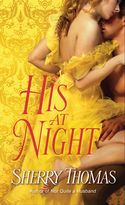My favorite way to learn history is to come across it via fiction. Of course,
since my favorite kind of history is not the chronicle of kings and queens, but
everyday history–what people ate, how they lived, what they did to get away
from it all–it is these details and quirks of history that stay with me.
For example, in
Laura
Kinsale’s FOR MY LADY’S
HEART–for my money, one of the best medieval romances ever written–the
hero is a knight, the heroine is far above him in worldly stature: she is a
princess. On the run from danger, it is the two of them against the world. One
scene in the book has her giving him an orange and a stick of violet-scented
sugar that made up part of her meal.
And this is a paragraph from that scene:
He sucked the fruit, allowing the rich bitter juice to run on his tongue.
He’d had oranges in Aquitaine a few times, at feasts and Christmas–but to eat
one every day as she did was something utterly beyond his experience. And the
penidia: he’d never tasted white sugar but once, a score and more Christmas
gone, a child at the high board with his father and mother.
For a thirty-year-old man from a good family to have had sugar but twice in his
life–oney was the far commoner sweetener for the medieval age–paints a vivid
picture not only of the rarity of sugar, but just how differently and
extravagantly the aristocracy lived.
I’m going to borrow from
Laura Kinsale again–the
lady is just so skillful at weaving historic details into her narrative, you
never feel that she is info-dumping or lecturing, but she reconstructs her eras
beautifully and completely. This time the book is
THE SHADOW AND THE STAR, set
in 1887, during Queen Victoria’s Golden Jubilee celebration.
The heroine, who joins the hero’s household as his secretary, reads newspaper
articles on the Jubilee to him and a gathering of servants.
While Leda had been reading, at the far end of the conservatory the kitchen
staff had set a table with a festive array of light luncheon food, but everyone
was still gathered around her with intent faces. She grew daring, and concluded
her reading with a droll advertisement for the Patented Patriotic Bustle, which
was guaranteed to play “God Save the Queen” whenever the wearer sat down.
The scullery maids found that impossibly funny, especially after Sheppard
solemnly pointed out what an exhausting device it must be, since every good
Englishman must immediately stand up upon hearing the tune. Even the French
chef laughed.
I laughed too, and always remembered it. And not only for the exoticness of the
advertisement. Let’s face it, sure we don’t wear bustles anymore, and we don’t
want our spanx to sing, but is the Patented Patriotic Bustle all that different
from some of the wilder and wackier products of our time? This made me feel an
unexpected connection to the Victorians. For all that we usually think of them
as staid and rule-bound, they were living in a wild and wacky world too.
In my own books, I try to incorporate historical tidbits that strike me as
memorable, usually things that are markedly different from our current era. In
researching for
DELICIOUS, which features a
heroine who is a cook, I loved learning about the servants’ ball. In the
nineteenth century, a private establishment of any size often had some forty
servants–the bigger aristocratic households had more than a hundred–and the
servants too had their rituals and amusements, with the servants’ ball being the
event in their annual calendar.
It can be quite an elaborate affair, with a big buffet laid out, and everyone in
their Sunday best. The housekeeper and the butler lead the maids and the
menservants, respectively, in a grand promenade to open the ball. And then the
lord of the manor dances with the housekeeper, the lady of the house with the
butler–probably the only time of the year when masters and servants mingle
socially.
During the writing of my new release,
HIS AT NIGHT, while
researching country houses, I was enthralled by the tremendous gardens that were
part and parcel of these ancestral piles. The flower gardens were actually only
a small part of the whole. Remember how many servants such a manor entailed?
They all had to be fed three times a day. All the fruits and vegetables in
their diet–and that of the family’s–came from the estate’s own gardens.
But not only that, the Victorian gardeners on these great estates elevated
horticulture to an art form. They produced strawberries at Christmas and
pineapples in January. They had grape vines growing right at the dinner table,
so that a guest at the table had but to reach out to pluck a ripe grape.
Imagine that.
So of course I mentioned it in passing in
HIS AT NIGHT, just because
it is so darn interesting.
What fun and unexpected things have you learned from reading historical
romances? Or romances in general?
Please let me know. I will be giving away a copy of
HIS AT NIGHT to a commenter.
Sherry Thomas’s new book,
HIS AT NIGHT, is a Romantic
Times Top Pick.
Love is hottest in the darkness before dawn…
Elissande Edgerton is a desperate woman, a virtual prisoner in the home of her
tyrannical uncle. Only through marriage can she claim the freedom she craves.
But how to catch the perfect man?
Lord Vere is used to baiting irresistible traps. As a secret agent for the
government, he’s tracked down some of the most devious criminals in London, all
the while maintaining his cover as one of Society’s most harmless—and
idiotic—bachelors. But nothing can prepare him for the scandal of being
ensnared by Elissande.
Forced into a marriage of convenience, Elissande and Vere are each about to
discover they’re not the only one with a hidden agenda. With seduction their
only weapon against each other—and a dark secret from the past endangering
both their lives—can they learn to trust each other even as they surrender
to a passion that won’t be denied?
You can learn more about HIS
AT NIGHT and
Sherry’s other books at her
website.
To comment and for a chance to win please click here.




No Comments
Comments are closed.